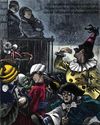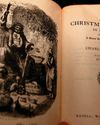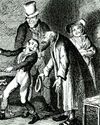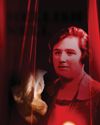
On 13 May 1787, a fleet of 11 ships carrying around 1,400 men, women and children, including around 700 convicts, left Portsmouth Harbour to sail to the other side of the world. Thieves, protesters, and petty criminals were crammed below deck, with the rolling of the waves and the wails of their companions the only sounds they would hear for the next eight months the amount of time it would take the so-called First Fleet to reach the shores of Australia.
The voyage marked the start of Britain's use of penal colonies Down Under, but transportation as a form of criminal punishment had first emerged in the 17th century. At the time of the fleet's sailing, the Bloody Code was in full force and many crimes carried the death penalty (see page 42). Sentencing a person to exile in a foreign land was regarded by many judges as preferable to execution and had the added bonus of making the criminal another country's problem.
The 1717 Transportation Act made banishing people overseas even simpler, stating that anyone sentenced for a serious crime would spend 14 years in an overseas penal colony, and anyone guilty of lesser felonies, such as theft, would be given a seven-year exile - the majority of people transported fell into the latter category. Also transported were protesters, such as the Tolpuddle Martyrs (who were punished, in 1834, for essentially forming a trade union). Around 85 percent of convicts transported to Australia between 1788 and 1868 were men, although their ages ranged wildly, from boys as young as nine to men well over 80 years old.
LOSS OF THE AMERICAS
Esta historia es de la edición July 2022 de History Revealed.
Comience su prueba gratuita de Magzter GOLD de 7 días para acceder a miles de historias premium seleccionadas y a más de 9,000 revistas y periódicos.
Ya eres suscriptor ? Conectar
Esta historia es de la edición July 2022 de History Revealed.
Comience su prueba gratuita de Magzter GOLD de 7 días para acceder a miles de historias premium seleccionadas y a más de 9,000 revistas y periódicos.
Ya eres suscriptor? Conectar

'Dickens's evocation of the fears, excitement and confusion of childhood is peerless'
DR LEE JACKSON ON WHY CHARLES DICKENS REMAINS RELEVANT TODAY

THE AUTHOR GOES ABROAD
Dickens expanded his horizons and boosted his fan-base by venturing overseas - but global fame came with a cost

REVIVING THE FESTIVE SPIRIT
A Christmas Carol wasn't just a bestseller - it changed the way that Britons chose to mark the festive season

GIVING THE POOR A VOICE
From Hard Times to Oliver Twist, Charles Dickens used his pen to help illuminate the lives of the less fortunate

A JOURNEY THROUGH DICKENS'S LONDON
The works of Charles Dickens are synonymous with visions of Victorian London. We talk to Dr Lee Jackson about the author's love of the capital, and the locations that most inspired him

EXCEEDING EXPECTATIONS
Dr Lee Jackson chronicles Charles Dickens's journey from down-at-luck teenager to titan of Victorian literature

GIFTS, TREES & FEASTING
We take a journey through the photo archives to reveal how Christmas and its many traditions have been celebrated over the years - and around the world

WHAT GREAT PAINTINGS SAY
We explore the story behind an allegorical painting that celebrates the triumph of love over hate, peace over war

HELLISH NELL
Malcolm Gaskill delves into the life of Helen Duncan - the fraudulent Scottish medium whose ectoplasm-filled seances saw her ending up on the wrong side of the law

7 THINGS YOU (PROBABLY) DIDN'T KNOW ABOUT THE WHITE HOUSE
Presidential historian Dr Lindsay M Chervinsky reveals some of the most surprising facts about the world-famous US residence